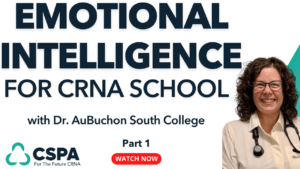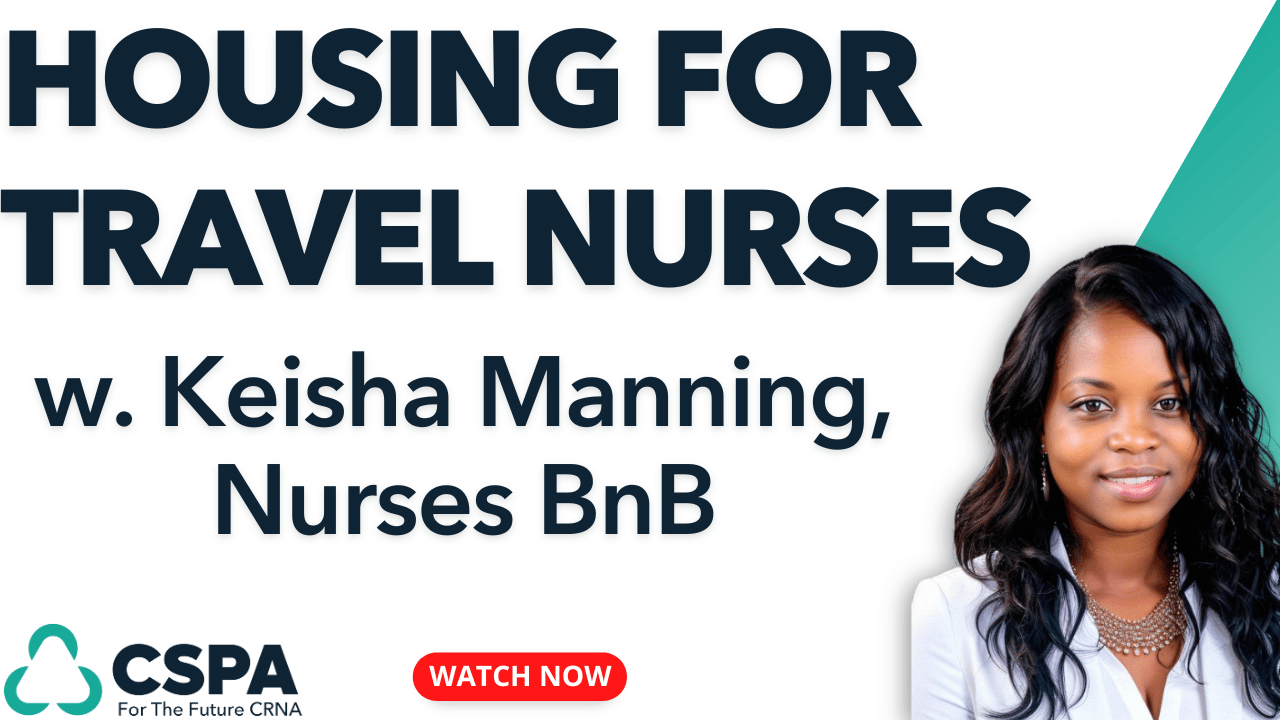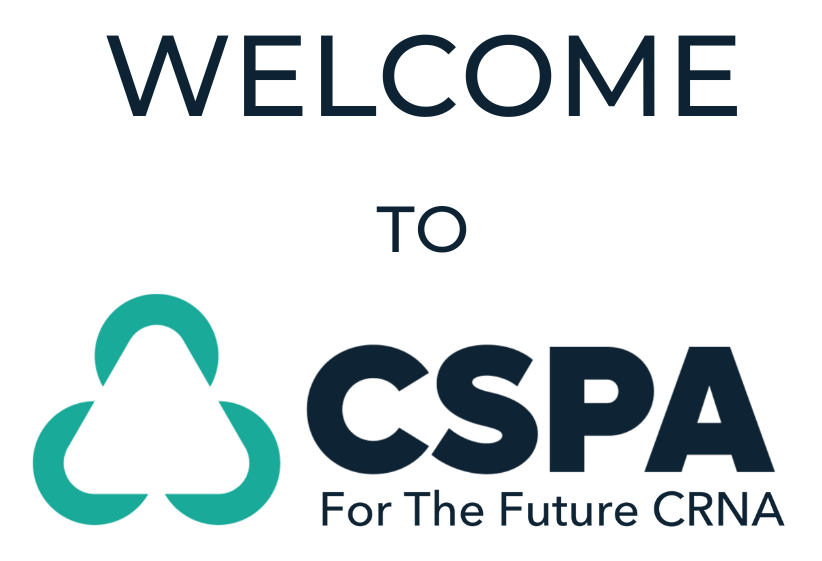
Get Your Free CRNA School Interview Prep Guide
Free CRNA School Interview Prep Guide Click Here
Dr. Dawn AuBuchon, a faculty member at South College and CSPA Expert Contributor, appears on Episode 3 of the Nurse Anesthesia Educators Unplugged Podcast. This podcast is exclusively for students of CRNA School Prep Academy.
Here’s a sneak peek of their discussion as they tackle the topic of Emotional Intelligence, including Resilience & Adaptive Functioning and how these topics relate to Nurse Anesthesia. They also discuss EI and the CRNA School Interview Process and whether a high I.Q. translates to high Emotional Intelligence.
Listen to the full episode inside CRNA School Prep Academy today!
Join CRNA School Prep Academy for Complete Access to This Episode and the Entire Nurse Anesthesia Educators: Unplugged Library PLUS ALL of the Planning & Application Tools, Interview Prep Tools and More That Have Helped Thousands Of Nurses Gain Acceptance Into CRNA School: https://www.crnaschoolprepacademy.com/join
Join the CSPA email list: https://www.cspaedu.com/podcast-email
Join the Free Facebook Community here! https://www.facebook.com/groups/crnaschoolprepacademyfree
Book a mock interview, resume or personal statement critique, transcript review and more: www.teachrn.com
—
Watch the episode here
Listen to the podcast here
Emotional Intelligence – Do I Have It? Part 1 With Dr. AuBuchon, Program Faculty At South College
I have some exciting news to share with you. We have released the Nurse Anesthesia Educators Unplugged, which is going to be your gateway to success. I want you to discover the inside scoop. I want you to be able to navigate the complexities of CRNA admissions and thrive as a candidate and a nurse anesthesia resident, which can seem like a daunting task, but what if you had a trusted guide at your fingertips? This is why we’re excited to introduce the Nurse Anesthesia Educators Unplugged, which is CSPA’s private podcast, your one-stop auditory guide to achieving your CRNA dreams.
Here are the key benefits and features of this private podcast. We will hear directly from the experts, listen to seasoned CRNA faculty members who know the admissions process inside and out, and get invaluable insights, not from the brochures or websites. You’re going to hear from behind the scenes and discover the lesser-known details of the selection process, the traits that faculty look for in candidates, and the hidden pitfalls to avoid.
Knowing that all schools are a little unique, this is going to give you that invaluable insight that’s going to allow you to see the differences between different CRNA programs and the faculty that run these programs. You’re going to hear real stories, hear from successful students who have been in your shoes, and learn about their challenges, strategies, and what made them stand out. You’re going to get strategic advice. Beyond grades, how can you learn to craft a compelling application such as for your essay or your interview responses that will resonate with the admissions teams?
You’re also going to get flexible learning. You can listen to this podcast on your commute, during your workouts, or even while cooking. We want this learning to fit your schedule. You’re going to hear a lot of Q&As on these podcasts. These questions and answers are found in our private CSPA community. We pick questions that are commonly asked by CSPA students and bring them to the table during this faculty podcast. It’s a great way to hear commonly asked questions from a variety of faculty and different insights on that.
We also want you to stay up-to-date. The admissions landscape is always changing. We want to make sure that you’re updated on the latest trends, requirements, and strategies for success. Last but not least, we want to help you build confidence. Knowing what to expect and how to prepare can dramatically increase your confidence, giving you the edge during the application interview process.
I hope this sounds exciting to you. I hope you’re as pumped as I am to tune into these shows. Remember, if you’re a CSPA student, you’re going to have access to this private podcast, but don’t worry. We want to make sure we’re not excluding anyone from this podcast. On occasion, we are going to share sneak peeks with our regular CSPA audiences because I want everyone to succeed.

Emotional Intelligence: Nurse Anesthesia Educators Unplugged is your secret weapon to equip yourself with the knowledge, strategies and confidence to stand out.
Whether you’re a CSPA member for twelve months or a short period, you’re going to have access to the entire library of private CSPA faculty podcasts. This is a valuable resource that we are excited to bring to you. I want to lead you to the conclusion that whether or not you’re contemplating a CRNA career or you’re already deep in the application process, the Nurse Anesthesia Educators Unplugged is your secret weapon to equip yourself with the knowledge, strategies, and confidence to stand out. I hope you enjoy the sneak peek. Let’s go ahead and get into the episode.
—
What Is Emotional Intelligence?
We’re excited to be here, and we’re going to be talking about a topic that has become popular, at least in my experience, over the last several years. It has ballooned as we think about it, and that’s emotional intelligence. We’ve got our guest, Dr. Dawn AuBuchon. She is with South College. Many of you know her as also one of our expert consultants holding office hours with our guarantee program in CRNA School Prep Academy. We’re going to look at emotional intelligence. That’s going to be our topic. We want to thank Dr. AuBuchon for coming. Dr. AuBuchon, thank you for taking your time and being with us.
You’re welcome, Dr. Wilson. Thank you so much for having me here. I’m very excited to be here. It’s one of the topics that I love talking about with anyone willing to listen to me talk about it. Thank you.
Our community is going to want to read this because it has become over the years one of those topics. When I look and think about it over the thirteen years or so I’ve been in education, we talked about it. We asked questions about it, but it was never defined as emotional intelligence. That phrase was never put around those types of questions and that thought process. Daniel Goleman is the father of emotional intelligence but when you talk about EI, what is the definition of EI?
When you do go back and look at the early ’90s about EI, you will find a variety of definitions. I like that you said that because one of the things that are still trying to be established is the solid uniform definition of EI because there is no one set definition out there. I looked it up. When I wrote about it and presented it, it is and does wrap around other definitions out there. It’s awareness, control, and the ability to express emotions, “How do I express myself? How do I interpret how you express yourself? How do we relate and interact together?” That leads to handling interpersonal relationships, being sensible, and having empathy.
Everything that I’ve read, seen, and defined about it is centered on that aspect. It’s about what terminology is used to define it, but there are many interesting paths that I have gone down. I look forward to talking to you about that because it has ballooned. This was not something that was used in the field where that’s very important to have emotional intelligence.
When you look way back at how it was first established, it was human resource departments or managers. Big offices and companies were using emotional intelligence and doing those types of platforms to assess candidates to try to get the best fit. How are they going to interact then with members of the team and perhaps customers? When you dig into it, how did we not have this in nursing?
Why Is Emotional Intelligence Important?
That is what I find interesting. One of the things I’ve done is I’ve asked candidates. At any part of our CSPA forum that I’ve been a part of or during office hours, I said, “When you were in nursing school, did you ever talk about emotional intelligence? Did anybody ever come in and talk with you? Did you take any tests and read any books on it?” Many say no. I have had very few tell me, “We had an hour guest lecture on it, but that’s it.” I’ve gone into our high schools here locally to talk about it. Not many at all have heard about it. Why not? How do we get it out there?
Not many people have heard about emotional intelligence. So why not? How do we get it out there? Share on XThis is not just a corporation. This is not something that looks like it’s going to be a leadership fad and then move on. This looks like something that’s going to last.
When people looked at it or how they understood it, I don’t know that there was such a good understanding of, “How can this be moved into healthcare? Why should it be moved into healthcare?” I remember how I stumbled upon it. It was right around 2015 or 2016. I was putting together a leadership paper and developing a PowerPoint that I was going to use to speak on.
I started googling some information, and emotional intelligence came up. I started going through and digging into it, and I was like, “This is perfect,” but it’s only been over the last decade that this has become more prevalent and being looked at, especially in nursing overall education to promote adaptive functioning and resilience in stressful situations.
In one of the research reviews I did, there were around 57 reviews out there, research, or articles talking about this and the importance of bringing it into nursing education and what kind of difference could this make. If you think about it, if it’s about promoting adaptive functioning and resilience, and we think about our candidates who then become our students or our residents, they’re coming into our programs and wanting to be nurse anesthetists. Isn’t that what it’s about, adaptive functioning? How do you acclimate yourself to a very stressful environment? How do you become resilient?
Emotional Intelligence and the CRNA Interview Process
That resonated with me. We started evaluating our interview process. I talked with some other program directors out there, and they said, “We have looked at it and asked a couple of questions,” but in one of the programs, that was all they did. They had four different rooms that candidates would move through that were all emotional intelligence-based with different stressful types of scenarios. They wanted to see how they would react, how they handled themselves, and then how they managed through those relationships. I found that very interesting.
We started to integrate some of those questions. I started looking it up and started doing some research. I’ve now taken the Leadership Summit through the AANA. One of the focuses that year was emotional intelligence. Drew Bird was the main speaker. He’s got a great book out there, and I’ll tell you about those books at the end. I had this whole extensive testing done on myself because that was part of the conference, and he would do that. It was incredible how it was broken down, what you could look at, what you could change, what you needed to work on, and what you already did well.
Looking back now at the literature, that’s what everyone is trying to focus on. Personally, having talked with others out there, COVID made a big change in how we need to look at our candidates. Objective information is wonderful, but that’s the other correlation with emotional intelligence. It has nothing to do with your IQ. People would look at, “We’ve got 4.0 students here, yet they didn’t have good emotional intelligence.”

Emotional Intelligence: Emotional intelligence has nothing to do with your IQ.
I want to get into that. I’ve got a question for you on that. You hit exactly what I was thinking about. It was the resilience piece. COVID accelerated everything, but then we have a lot of people whose overall GPA are 4.0 or 3.96. That’s their science GPA. They haven’t struggled through anything in their academic career because they are very brilliant people. I’m not sure I could get in if I had to apply these days with what I had coming into it. We have a lot of brilliant individuals and nurses. Does IQ even relate to EI? We think, “If they’re very smart, they should be able to figure this out.”
I’m so glad you asked about it because it is one of the things I talk about. We’re hardwired a certain way. Our IQ has no correlation to our emotional intelligence. Our IQ is not flexible. It’s set for us at a very early age. Most of what I’ve learned and read about that is what my IQ was when I was 15 is the same as my IQ if I was tested here at 51, but the beautiful thing about emotional intelligence is it’s trainable. It’s flexible. It’s based on core emotions like shame, fear, sadness, anger, and happiness. Those are the core emotions that we deal with. How in tune we are with those emotions is how we adapt, train, and adjust our EQ or EI, our Emotional Intelligence.
—
That sums up the show. Thank you so much for reading. I hope you found that so valuable. I look forward to sharing some more golden nuggets with you in the future. If you’re a CSPA member, there will be an entire section inside the academy that’s labeled Nurse Anesthesia Educators Unplugged Podcast. It will be inside the membership. You log into your membership to have access to this. You can play this on audio whenever you are driving, cooking, folding laundry, or whatever fits your learning style.
We hope you find a lot of value in these episodes, and we’re excited for future episodes to share with you. Until next time, thank you so much for reading. I appreciate you. If the show has been helpful for you and your CRNA journey, I would so very much appreciate it if you were able to share this valuable show with others that you know who are embarking on their CRNA journey. I call it paying it forward.
If this has been a valuable resource for you or a valuable tool on your CRNA journey, I would greatly appreciate it if you were able to share it with someone else down the road. Even if you don’t know anyone, keep us in mind to make sure you send people our way because we want to help you and your peers find success. Cheers to your future. Thank you so much. Until next time, take care.
Important Links
Join CRNA School Prep Academy for Complete Access to This Episode and the Entire Nurse Anesthesia Educators: Unplugged Library PLUS ALL of the Planning & Application Tools, Interview Prep Tools and More That Have Helped Thousands Of Nurses Gain Acceptance Into CRNA School: https://www.crnaschoolprepacademy.com/join
Join the CSPA email list: https://www.cspaedu.com/podcast-email
Join the Free Facebook Community here! https://www.facebook.com/groups/crnaschoolprepacademyfree
Book a mock interview, resume or personal statement critique, transcript review and more: www.teachrn.com









